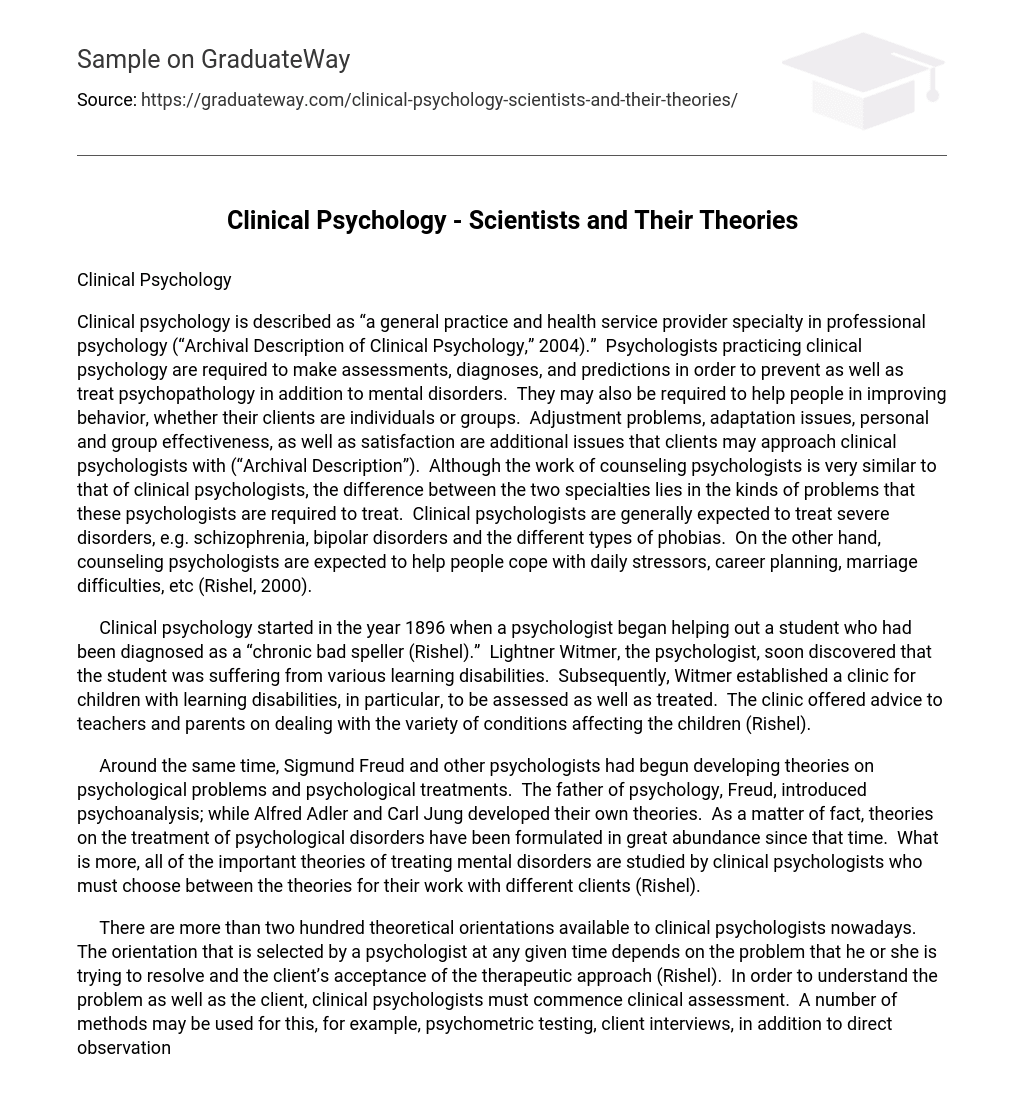Clinical Psychology
Clinical psychology is described as “a general practice and health service provider specialty in professional psychology (“Archival Description of Clinical Psychology,” 2004).” Psychologists practicing clinical psychology are required to make assessments, diagnoses, and predictions in order to prevent as well as treat psychopathology in addition to mental disorders. They may also be required to help people in improving behavior, whether their clients are individuals or groups. Adjustment problems, adaptation issues, personal and group effectiveness, as well as satisfaction are additional issues that clients may approach clinical psychologists with (“Archival Description”). Although the work of counseling psychologists is very similar to that of clinical psychologists, the difference between the two specialties lies in the kinds of problems that these psychologists are required to treat. Clinical psychologists are generally expected to treat severe disorders, e.g. schizophrenia, bipolar disorders and the different types of phobias. On the other hand, counseling psychologists are expected to help people cope with daily stressors, career planning, marriage difficulties, etc (Rishel, 2000).
Clinical psychology started in the year 1896 when a psychologist began helping out a student who had been diagnosed as a “chronic bad speller (Rishel).” Lightner Witmer, the psychologist, soon discovered that the student was suffering from various learning disabilities. Subsequently, Witmer established a clinic for children with learning disabilities, in particular, to be assessed as well as treated. The clinic offered advice to teachers and parents on dealing with the variety of conditions affecting the children (Rishel).
Around the same time, Sigmund Freud and other psychologists had begun developing theories on psychological problems and psychological treatments. The father of psychology, Freud, introduced psychoanalysis; while Alfred Adler and Carl Jung developed their own theories. As a matter of fact, theories on the treatment of psychological disorders have been formulated in great abundance since that time. What is more, all of the important theories of treating mental disorders are studied by clinical psychologists who must choose between the theories for their work with different clients (Rishel).
There are more than two hundred theoretical orientations available to clinical psychologists nowadays. The orientation that is selected by a psychologist at any given time depends on the problem that he or she is trying to resolve and the client’s acceptance of the therapeutic approach (Rishel). In order to understand the problem as well as the client, clinical psychologists must commence clinical assessment. A number of methods may be used for this, for example, psychometric testing, client interviews, in addition to direct observation of the client’s behavior. Assessment typically follows advice or counseling, if not psychotherapy (“Clinical Psychology,” 2007). It is at this point that the psychologist must decide on the therapeutic approach that is expected to work best. Scientific research on the efficacy of various therapeutic approaches for treating different disorders is rather helpful for the clinical psychologist in decision making.
Lastly, clinical psychologists are able to work in a variety of settings. While many clinical psychologists choose private practice, others work as researchers or trainers in universities. Clinical psychologists may also work in social care and health settings, including health centers, hospitals, community mental health centers, child and/or adolescent mental health centers, in addition to social services. Most clinical psychologists work as part of teams, for example, with social workers, prison management, and medical practitioners (“Clinical Psychology”). Regardless of where and with whom they choose to work, clinical psychologists are always in demand.
References
Archival Description of Clinical Psychology. (2004). Commission for Recognition of Specialities
and Proficiencies. Retrieved Dec 1, 2007, from http://www.apa.org/crsppp/clipsych.html.
Clinical Psychology. (2007). The British Psychological Society. Retrieved Dec 1, 2007, from
http://www.bps.org.uk/careers/areas/clinical.cfm.
Rishel, J. (2000). Careers in Clinical and Counseling Psychology. Retrieved Dec 1, 2007, from
http://www.wcupa.edu/_ACADEMICS/sch_cas.psy/Career_Paths/Clinical/Career03.htm.





